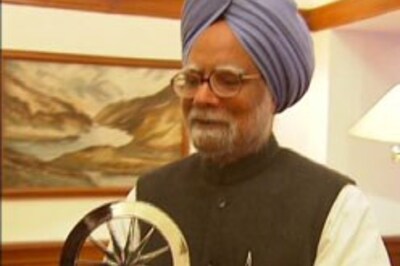
views
Hyderabad: It was in the 20th century that Children's Film Society, India (CFSI) last released a film in the theatres. The millennium has changed, and so have the kids and the business of cinema.
CFSI, sadly, seemed to have lost touch. Some of the best children's films of the new millennium -- 'Taare Zameen Par', 'Makdee', 'Chillar Party' and 'I Am Kalam' -- first came to CFSI, but were surprisingly rejected.
CFSI is all set to break the jinx in 2011 with its film 'Gattu' garnering lavish praise, both from kids and adults, at its premiere in The Golden Elephant 17th International Children's Film Festival India (ICFFI) now on in Hyderabad. It was the opening film at the festival, and for once in a long time in CFSI's history, it was in step with the times.
"Most children's films are didactic and boring. I wanted to make a fun film where the message was not overbearing but more like a natural progression," director Rajan Khosa told IANS.
In a small town, kids and adults are equally obsessed with kite-flying. The airspace is dominated by a black kite called Kali with mysterious origins. A street kid Gattu dreams of defeating Kali but fails. He sees that the local school has a roof which will give him a vantage point.
He joins the school with this intention in mind but has to pretend to be interested in studying. The only problem -- he is illiterate.
"The general impression in the minds of people is that street kids are dumb. Actually they are far smarter than we give them credit for," says Khosa.
"We worked a lot on the script and the film is promising. Its hooting reception from kids pleasantly surprised us. We are looking to tie up with an established distributor to ensure that the film gets its fair chance," Nandita Das, chairperson CFSI, told IANS.
In a short, restored film that was shown at the opening ceremony of the festival, Jawaharlal Nehru is seen interacting with kids and telling them why children's cinema needs focus. He is seen talking about children's cinema that is good, intelligent and in step with the times. And this, he tells kids in this film shot in 1956, was the precise reason CFSI was set up.
Indeed in its heydays, the best filmmakers in the country made films for CFSI and the best actors acted in them. But over half a century into its existence, the largest children's content maker and rights holder in India (over 250 films in 15 different languages) and one of the five largest in the world, CFSI stands accused of having lost touch.
But Nandita Das does not want to talk about the past. "I am trying to put systems in place so that they go beyond the individual because the chairperson and CEO changes. There has to be systemic changes that last longer," she says.
The ICFFI this year has had its fiascoes. But no one can deny that the number, variety and scope of films with 13 theatres and 154 films from 38 countries, made this the largest children's film festival ever in the country and one of the largest in the world. And all of these have been possible because a lot of young blood has been pumped into the organization and the festival by Nandita.
But for how long will this change last? CFSI has traditionally performed as good or as best as its chairperson. The last time it did really well was during the tenure of Jaya Bachchan who brought strictness and discipline into the organisation.
In this respect, a key time for CFSI would be August 2012 -- when Nandita's tenure ends.



















Comments
0 comment